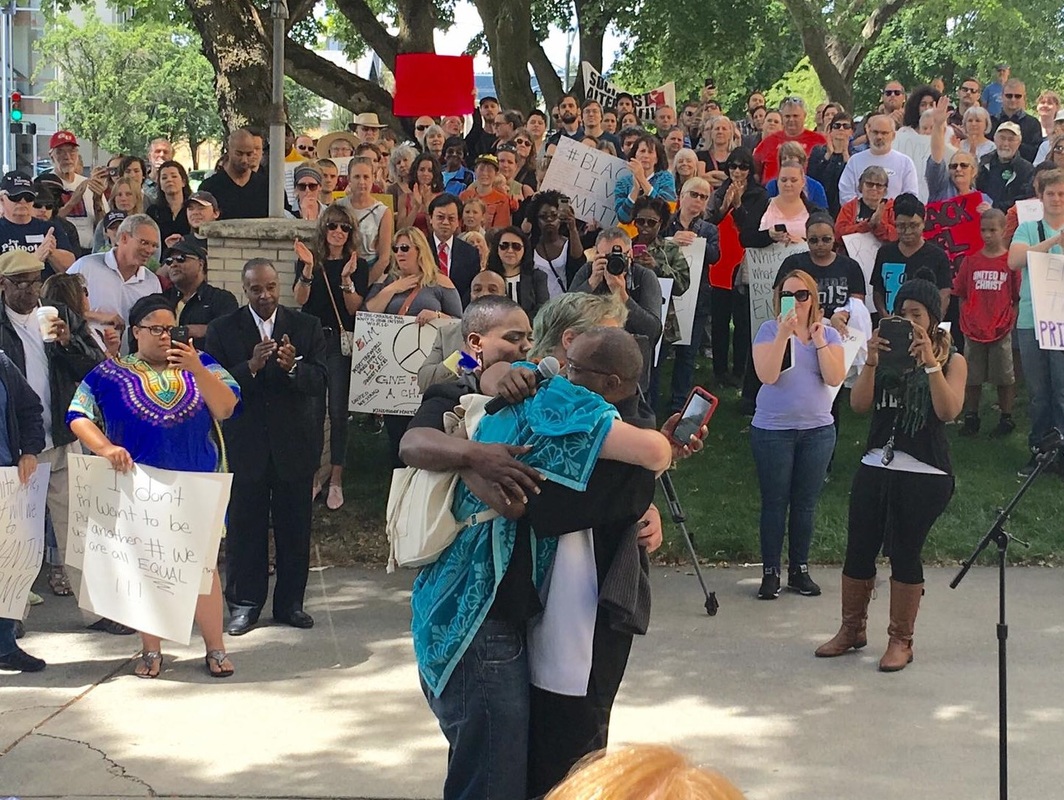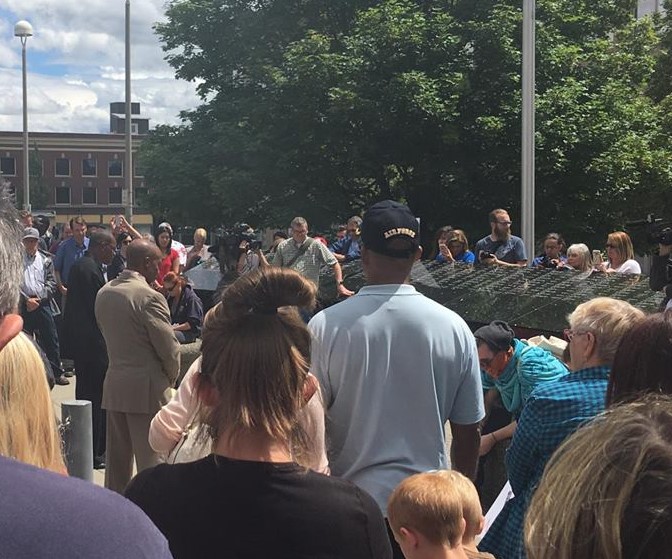|
I've written a lot about the courage of American World War II nurses, but this week I discovered the heroism of a Canadian nurse, and learned the story of her valiant effort to save a friend after a torpedo attack by the Germans. I also discovered how taking a step or two out of my comfort zone can generate courage, and I witnessed an amazing step toward peace and reconciliation. It was quite a week after last week's violence combined with my historical photo research. In ten years as a television news reporter I attended scores of demonstrations. Often when there was a protest, there were protesters protesting the protest. Never once did I see the two sides come together as I did last week at Spokane, Washington's #BlackLivesMatter rally. But that's what's happening in this photo. An African American pastor asked the crowd to stop reacting to a heckler, then invited the heckler up for a hug. Later, the head of the local NAACP offered the protester the mic and him speak, while the crowd listened respectfully. Before the end of the rally, those who came to say #BlackLivesMatter, walked to police headquarters and gathered at the memorial for fallen police officers. With a moment of silence and a prayer they demonstrated #BlueLivesMatter, too. The spirit of the rally moved me. I found myself in tears several times as speakers talked of justice, and of healing divisions, of valuing all lives, of ending violence and working toward understanding. I came away empowered, empowered not to be silent in the face of trouble, but also, not to be strident and not to be judgmental. Opportunity immediately presented itself! Empowered not to be silent in the face of trouble, but also, not to be strident and not to be judgmental. Isn't it funny how that is? This week my personal life offered me the chance to climb down off my high horse, lay down my sword and shield and make the first move toward dialogue. Yes, it was scary. I was afraid I might makes things worse. I was afraid I might get hurt. But at the rally, I had joined the chant silence is consent to the status quo. And I found myself braver than I ever knew I could be. 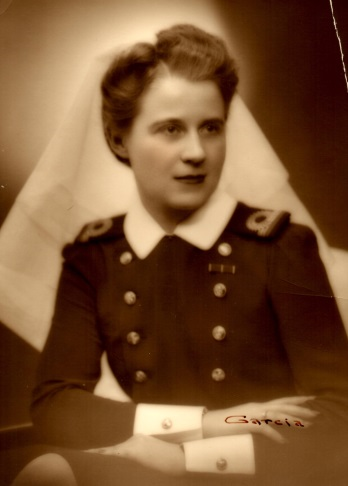 Which brings me to Canadian WWII Nurse Margaret Brooke and the fact that sometimes you can summon your greatest courage and still fail in your task. When the German torpedo slammed against the passenger ferry, the SS Caribou, in the early morning darkness of October 14, 1942, Margaret and Nurse Agnes Wilke were asleep in their bunks. Margaret and Agnes made it to the deck, but their life boat was gone. The ship, crossing Cabot Strait off the coast of Newfoundland, sank in just five minutes, taking the women into the water. "We were just busy staying afloat until an overturned lifeboat came along and the people on that helped us," Margaret said later. They grasped ropes, "and we just hung there."
It would be nearly two hours before rescuers arrived, and before then Agnes' strength collapsed. With one arm Margaret clung tight for her survival, and with the other she held onto her friend. "I held her as long as I could," Margaret says. "I failed. I couldn't hold her any longer." Agnes slipped into the cold depths, one of 137 passengers and crew to die that night. For her selfless act, Margaret Brooke was named a Member of the Order of the British Empire, and the Royal Canadian Navy has named an offshore patrol boat after her. Okay, I'm not saying I'm a hero like Margaret Brooke, far from it. What I'm saying is that whether it's a large step or a small one, when we venture from our comfort zone, we risk failure. And often there's a lot of failure before big change is achieved. But no matter how small, every successful step toward dialogue moves us closer to peace. Small steps also give us hope and strengthen us to take big ones. I've been doing photo research for my upcoming book about African American women in the 1940's, and the racial prejudice they suffered while serving in the United States Army. The lynching of blacks was a fact of life for these women, and though it happened mostly in the south, blacks were lynched in northern states, too. I'd been putting off choosing a photo for this part of the story, but finally had to face the images and they left me depressed for days. Especially after stumbling across a new study that documents the number of lynchings in America is 700 more than previously believed. Titled Lynching in America: Confronting the Legacy of Racial Terror, the report says 3,959 lynchings of African-Americans took place from 1877 to 1950 in states across the South. 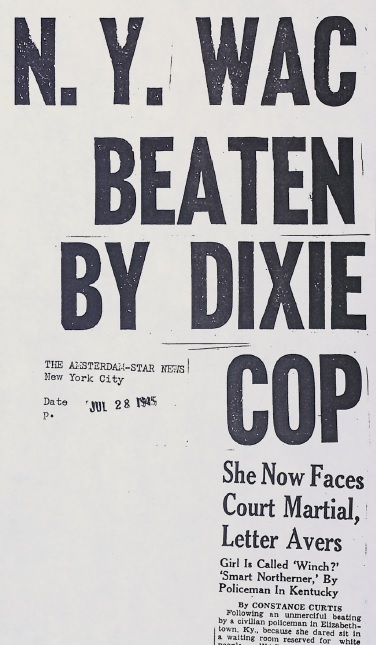 I'll spare you the images, but take a look at this bit of my research. An African American in the Women's Army Corp spent a week in the hospital being beaten by a civilian cop for sitting in white waiting room at the bus station in Elizabethtown, KY. The cop smashed Private Helen Smith over the head with a blackjack, dragged her across the bus station floor and threw her in the town jail. When she was handed over to military police at Fort Knox, she was ordered to face court martial for disorderly conduct and disobeying Kentucky Jim Crow laws. Two other WACs, beaten less severely were similarly charged. The three service women were eventually aquitted when NAACP lawyers argued Kentucky didn't actually have Jim Crow laws written in the books. The civilian cop faced no repercussions in the case. The news of two black men killed by police this week and at least four police officers shot to death overnight has added to my very heavy heart. People have very strong feelings on both sides of this issue, but I wish we could create a safe space to talk about violence in America. 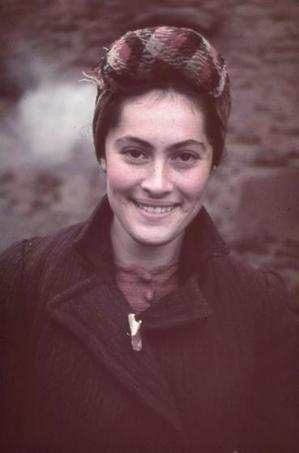 Since writing the adaption of IRENA'S CHILDREN last year, I've been much more tuned into Polish history, and the atrocities Poland suffered under the Nazis. This week I stumbled across some haunting color photographs taken by Adolf Hitler's personal photographer, Hugo Jaeger, in occupied Poland in 1939 and 1940. They are heart-breaking, but I looked at each nameless person and envisioned them beyond the photograph--as flesh and blood, with loved ones, with a life of joys and struggles-- all cut short by the Nazi regime. See the photos here, in a piece called The Brink of Oblivion. Does remembering the victims move us closer to peace? I don't know. But it's something. Click here to check out an interactive database with information
on police killings in the last eighteen months. There's tons of information, and you can decide for yourself what you think. Police have a dangerous job. They are often on calls where they fear for their lives.They are human and vulnerable to mistakes when they have to make split-second decisions. Here you can see the honor roll of law enforcement officers killed this year. Information, talking and listening don't kill anyone. Let's give it a try. |
I'm fascinated to discover little-known history, stories of people and events that provide a new perspective on why and how things happened, new voices that haven't been heard, insight into how the past brought us here today, and how it might guide us to a better future.
I also post here about my books and feature other authors and their books on compelling and important historical topics. Occasionally, I share what makes me happy, pictures of my garden, recipes I've made, events I've attended, people I've met. I'm always happy to hear from readers in the blog comments, by email or social media. Archives
September 2023
Categories
All
|
